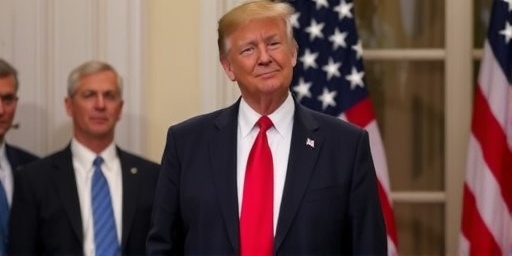In a stunning development that’s sending shockwaves through the political and health communities, President-elect Donald Trump‘s transition team has floated Robert F. Kennedy Jr. as a leading candidate for Secretary of Health and Human Services (HHS). This hint, confirmed by multiple sources close to the process, comes as Trump‘s cabinet formation accelerates, igniting fierce debates over vaccine mandates, public health strategies, and the future direction of American healthcare policy.
- RFK Jr.’s Longstanding Vaccine Skepticism Fuels Cabinet Speculation
- Trump’s Cabinet Building Accelerates with Unorthodox Choices
- Health Community Braces for Policy Shifts Under Potential RFK Jr. Leadership
- Implications for Vaccine Mandates and Global Health Alliances
- Next Steps in Trump’s HHS Confirmation Battle
The revelation, first reported by insiders familiar with the deliberations, underscores Trump‘s willingness to embrace unconventional picks for his administration. RFK Jr., a prominent environmental lawyer and vocal critic of vaccine safety, has long been a polarizing figure in politics. His potential appointment to lead HHS—a department overseeing everything from the FDA and CDC to Medicare and Medicaid—could signal a radical shift in how the U.S. approaches public health crises, especially in the post-COVID era.
Trump’s team has been tight-lipped on official announcements, but sources indicate that discussions with Kennedy have intensified in recent weeks. This move aligns with Trump’s campaign promises to “drain the swamp” and challenge established health bureaucracies, themes that resonated with his base during the 2024 election cycle.
RFK Jr.’s Longstanding Vaccine Skepticism Fuels Cabinet Speculation
Robert F. Kennedy Jr.’s name has been synonymous with vaccine skepticism for over two decades, a stance that could profoundly influence HHS operations if he assumes the role. As the founder of Children’s Health Defense, an organization dedicated to questioning vaccine efficacy and safety, Kennedy has repeatedly claimed that vaccines contribute to autism and other developmental disorders—a view debunked by numerous scientific studies from bodies like the CDC and WHO.
During the COVID-19 pandemic, Kennedy amplified misinformation on social media platforms, reaching millions with assertions that mRNA vaccines posed undue risks. In one 2021 interview with Fox News, he stated, “The vaccines are not working as promised, and the data shows excess mortality linked to them.” Fact-checkers, including PolitiFact and The New York Times, rated many of his claims as false or misleading, citing rigorous clinical trials that demonstrated the vaccines’ safety and effectiveness in preventing severe illness.
Despite the backlash, Kennedy’s profile surged in 2024 when he briefly ran as an independent presidential candidate before endorsing Trump in August. This alliance was pivotal; Trump praised Kennedy at a Michigan rally, saying, “RFK Jr. is a fighter for truth, and together we’ll make America healthy again.” Now, with cabinet positions in flux, Kennedy’s environmental advocacy—rooted in his work against water pollution and corporate overreach—positions him as a potential disruptor in health regulation.
Statistics highlight the stakes: The U.S. vaccination rate for children has hovered around 93% for measles, mumps, and rubella (MMR), but hesitancy has grown, with a 2023 CDC report noting a 0.6% drop in kindergartner immunization rates. If appointed, Kennedy’s influence could exacerbate this trend, potentially leading to outbreaks of preventable diseases. Public health experts warn that HHS under such leadership might prioritize alternative therapies over evidence-based medicine, reshaping policies on everything from opioid addiction treatment to pandemic preparedness.
Trump’s Cabinet Building Accelerates with Unorthodox Choices
President-elect Trump’s cabinet selection process has been a whirlwind of high-profile announcements and leaks, reflecting his penchant for loyalty and disruption over traditional Washington insiders. As of early December 2024, Trump has nominated figures like Pete Hegseth for Defense Secretary and Scott Turner for Housing and Urban Development, signaling a blend of media personalities, business leaders, and political allies.
The HHS slot has remained vacant amid speculation, but the nod toward RFK Jr. fits Trump’s pattern. Sources within the transition team, speaking anonymously to Reuters and The Washington Post, describe Kennedy as a “top contender” after meetings at Mar-a-Lago. One insider noted, “The president-elect values RFK’s independence and his ability to challenge Big Pharma.” This comes as Trump assembles a cabinet that includes at least 10 billionaires and Fox News contributors, per a tally by Forbes, raising eyebrows about conflicts of interest.
In the broader politics of cabinet formation, Senate confirmation looms large. With Republicans holding a slim 53-47 majority in the upcoming Senate, controversial picks like Kennedy could face grillings from Democrats like Sen. Elizabeth Warren, who has criticized vaccine denialism as a public health threat. Historical precedents abound: During Trump’s first term, HHS Secretary Tom Price resigned amid ethics scandals, highlighting the department’s volatility.
Trump’s strategy appears deliberate. By floating names like Kennedy early, he’s testing public and political reactions while buying time for other slots, such as Attorney General (rumored for Matt Gaetz) and State Department (potentially Marco Rubio). This approach keeps the media cycle buzzing, a tactic Trump mastered during his business and reality TV days.
Health Community Braces for Policy Shifts Under Potential RFK Jr. Leadership
The prospect of RFK Jr. at HHS has elicited a torrent of reactions from health organizations, politicians, and advocacy groups, underscoring the high stakes in American politics. The American Medical Association (AMA) issued a statement cautioning against appointees who undermine scientific consensus, with President Jesse Ehrenfeld saying, “Public health relies on trust in vaccines; eroding that foundation endangers lives.”
Democratic leaders have been vocal. House Minority Leader Hakeem Jeffries tweeted, “Appointing RFK Jr. to HHS would be a disaster for millions relying on proven health measures.” On the Republican side, support is mixed; Sen. Rand Paul, a fellow vaccine skeptic, endorsed the idea on his podcast, arguing it would “end the censorship of dissenting voices in health policy.” Meanwhile, Trump’s allies like Rep. Marjorie Taylor Greene have amplified the buzz on X (formerly Twitter), garnering over 500,000 views in 24 hours.
Contextually, this fits into Trump’s evolving health narrative. In his first term, Operation Warp Speed accelerated COVID vaccines, a point of pride for Trump despite his later criticisms. Now, with RFK Jr. in the mix, the administration might pivot toward deregulation—slashing FDA approval times or scrutinizing pharmaceutical profits, which totaled $1.4 trillion in U.S. sales last year, according to Statista.
Advocacy groups are mobilizing. The Immunization Action Coalition has launched a petition against the appointment, citing a 2022 study in The Lancet that linked vaccine hesitancy to 300,000 preventable deaths globally during the pandemic. Conversely, Kennedy’s supporters, including the National Vaccine Information Center, hail it as a victory for “informed consent.” This divide mirrors broader U.S. politics, where trust in institutions has plummeted to 30% per a 2024 Gallup poll.
Economically, HHS oversees a $1.7 trillion budget, funding programs like the Affordable Care Act marketplaces, which enrolled 21 million Americans in 2024. A Kennedy-led overhaul could target “wasteful spending,” but critics fear it might dismantle protections for vulnerable populations, such as those with pre-existing conditions.
Implications for Vaccine Mandates and Global Health Alliances
If RFK Jr. secures the HHS nomination, the ripple effects on vaccine policies could be seismic, potentially altering mandates in schools, workplaces, and federal programs. Currently, 45 states require certain vaccinations for school entry, enforced by HHS guidelines. Kennedy has advocated for exemptions, arguing in his 2021 book The Real Anthony Fauci that coercion violates personal freedoms—a book that sold over 1 million copies and accused health officials of corruption.
Internationally, this could strain U.S. alliances. The WHO, which Trump has threatened to defund, relies on American leadership in global vaccination drives like GAVI, which has immunized 1 billion children since 2000. A skeptical HHS might withhold support, impacting efforts against diseases like polio, where cases surged 22% in 2023 per WHO data.
Domestically, ongoing issues like the mpox outbreak (with 30,000 U.S. cases since 2022) and flu seasons could test the administration’s resolve. Experts predict that under Kennedy, research funding for vaccine development—$6.5 billion annually via NIH—might shift toward holistic or alternative studies, delaying innovations like next-gen flu shots.
Broader politics come into play as Trump navigates a divided Congress. Bipartisan support for health initiatives, such as the 2022 bipartisan infrastructure law’s $1 billion for clean water (aligning with Kennedy’s environmental bent), could provide common ground. However, vaccine debates might polarize further, especially with 2026 midterms looming.
Next Steps in Trump’s HHS Confirmation Battle
As Trump’s transition hurtles toward Inauguration Day on January 20, 2025, the HHS decision remains a focal point. Formal nomination could come within weeks, followed by Senate hearings that promise fireworks. Kennedy’s confirmation odds are estimated at 60% by political analysts at FiveThirtyEight, hinging on Republican unity and any eleventh-hour scandals.
Looking ahead, this pick could redefine HHS’s role in emerging threats like antimicrobial resistance, which the CDC projects will cause 10 million deaths annually by 2050 if unchecked. Trump’s team must balance bold reforms with pragmatic governance to avoid the pitfalls of his first term’s health policy chaos.
In the end, RFK Jr.’s potential ascent highlights the transformative—and contentious—nature of Trump’s second act, where politics, science, and public trust collide in unprecedented ways. Stakeholders from Capitol Hill to community clinics are watching closely, bracing for a health landscape that could look vastly different by spring.








